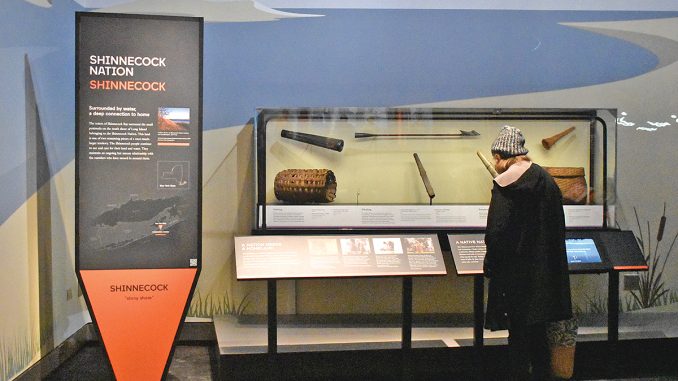
In the early 1900s, a group of Montaukett Indians came to a Riverhead courtroom as part of a long-running legal drama. Their hope was to reclaim ancestral land at Montauk Point. Wealthy real estate interests and the Long Island Rail Road had pushed them out; some of their homes had been torched to reinforce that they were no longer welcome.
The courtroom was full that day. Other Montauketts spilled out onto Griffing Avenue. What they heard from Judge Abel Blackmar — even while seated right in front of him — was that they didn’t exist. Their people, their nation, their culture, was extinct. And if they didn’t exist, the court reasoned, they had no rights to land.
Last week, more than a century after Blackmar’s erasure, New York Gov. Kathy Hochul pounded another nail in the coffin of Native history on Long Island. She vetoed a bill that would have given the Montaukett Nation state recognition. Her predecessor, Andrew Cuomo, vetoed a similar bill.
Both governors found legal technicalities to justify their actions. In the Montauketts’ quest for recognition as a distinct people — a nation — something has always been found missing, some critical piece of paperwork. The denials from Cuomo and Hochul were hardly different from Judge Blackmar’s and their end result was the same: We don’t see you.
We applaud state Sen. Anthony Palumbo (R-New Suffolk), who co-sponsored the bill for state recognition of the Montaukett Nation. He said the latest veto added to the historic injustice committed against this land’s original inhabitants. We urge Mr. Palumbo and the state Senate — which passed the bill unanimously — to keep trying.
Mr. Palumbo is not only on the right side of a marginalized people, he is on the right side of history. And getting history right is step number one in keeping a democracy alive and well.
The governor’s veto reminds us that America can’t get its story straight. In this day and age, when we can’t even agree on who won an election, how do we discuss what actually occurred here after Europeans arrived to “discover” a place that had been inhabited for 10,000 years?
There is a grave in Cutchogue Cemetery of man named David Hannibal, a descendant of the Montaukett people. He lived in a shack on Fleets Neck in Cutchogue and took care of wealthy people’s gardens. He was born in 1856 and died in 1936.
The people English settlers called the Corchaugs were a subset of the Montauketts. To give legitimacy to the Montaukett Nation is to acknowledge, centuries later, the history of the very people — including David Hannibal — who lived on the North Fork and across all of present-day Suffolk County.
We on the North Fork are familiar with the names of those English settlers. Our streets are named after them. We name parks after dead politicians. But we know very little about the Native people, or their fate at the hands of European immigrants, because so little has been acknowledged.
Gov. Hochul missed a valuable opportunity to turn to a better page in the book of our past. Maybe she doesn’t understand Long Island history. If so, that’s yet another excuse. We’ve said before in this space that history isn’t a lump of clay you can mold into any shape you want.
History is not malleable. It just is. And it cant be altered or erased with a politician’s misguided veto.

